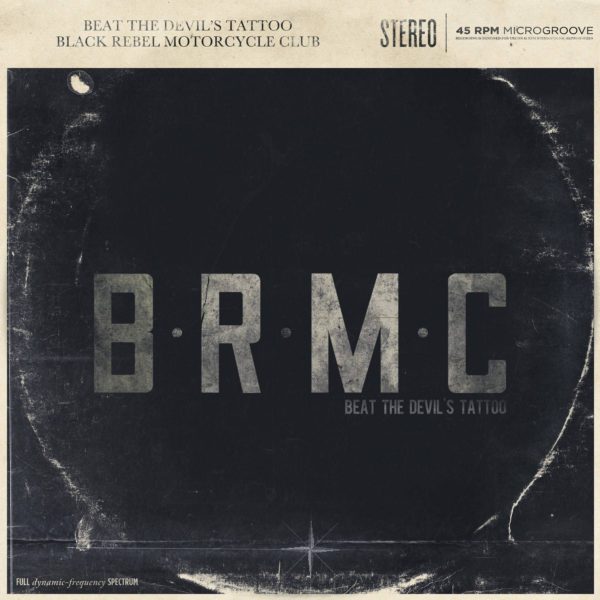Perhaps Black Rebel Motorcycle Club‘s greatest strength throughout all of this was their ongoing restlessness, the need to speak up and the overall attitude of not being impressed by the nonsense of anything standing in the way of a genuine rock’n’roll experience.
Almost 20 years ago, Black Rebel Motorcycle Club started out with their powerful, self-titled debut asking Whatever Happened To My Rock’n’Roll? while giving the perfect answer to it all with their range of albums that were to follow afterwards: The genuine, often dark-tinged and thoughtful abundance of songs that were delivered with noticeable passion far from the commercial appeal that would emerge around the band’s musical companions in the era of the early 2000’s and beyond. What happened to their rock’n’roll was their undaunted dedication and meaningful approach that have always been at the forefront of the band’s work.
New beginnings
Their sixth studio album Beat The Devil’s Tattoo, which celebrates its 10th anniversary this year, marked a new beginning for the Los Angeles based trio in a sense of moving on from their past troubles with former drummer Nick Jago who departed from the band in 2008 for good. Instead of falling into a sort of limbo, Robert Levon Been and Peter Hayes continued to grow and fearlessly open up a new chapter for the band by welcoming former The Raveonettes drummer Leah Shapiro into the band (and the recording process) who had been touring with Black Rebel Motorcycle Club ever since Nick Jago’s departure.
When being released in 2010, Beat The Devil’s Tattoo was quickly labeled as the album that perfectly blended BRMC’s versatile back catalogue of blues inspired rock with sharp edges, the more psychedelic and hazy soundscapes, their love for noisy, distorted guitars and grooving basslines as well as for the more stripped down, acoustic moments resulting in heartbreakingly beautiful piano-ballads like Long Way Down.
With Shapiro officially joining the band full-time, Black Rebel Motorcycle Club’s core was steady once again and the band ready to breathe new life into their creative process. The former tours together certainly helped to make it a rather smooth transition from the time being on the road together to a three-piece-band in the studio.
The many dimensions of BRMC

Black Rebel Motorcycle Club
During their long carreer of almost two decades in the spotlight, BRMC have always been exceptionally good at simply focusing on the music as their cornerstone, especially during their professional as well as personal ups and downs. Beat The Devil’s Tattoo showed no sign of the band slowing down. Neither did it compromise anything on a creative level that Black Rebel Motorcycle Club were aiming for.
To this date, it is rare and refreshing at the same time to see a band working so well in their own little realm. Trusting their instincts above all, giving zero fucks about anything that doesn’t resonate with them or their truth and yet being able convey their thoughts and emotions in a multi-dimensional way.
Beat The Devil’s Tattoo masterfully displays BRMC’s abilities to write straightforward rock songs (Conscience Killer), and yet, also come up with vulnerable stories of destruction and agony (The Toll, Sweet Feeling). Unlike most other rock bands, Black Rebel Motorcycle Club never seemed to play by the rules or questionable standards of the industry.
Their down to earth nature and their total lack of arrogance and megalomania perhaps did not fit into the genre’s many clichés (and still does not to this date), but it certainly made them more relatable and intriguing than many of their peers. Robert Levon Been and Peter Hayes are both extremely introspective songwriters without their egos determining the way or overshadowing their work.
Challenging the standards of contemporary rock music, Beat The Devil’s Tattoo comes to an end with the powerful Half-State, the album’s ten-minute-long heavy, guitar driven momentum that sends rock’n’roll’s often rather condensed songs packing.
The songs on Beat The Devil’s Tattoo speak volumes of how much the band continued to consciously break free from any expectations apart from their own. Their creative journey leading them towards a place that is challenging as much as it is comforting. Almost as if BRMC have blinders on keeping the (industry) bullshit away from their vision, yet being aware of it just enough to use it as the band’s fuel.
Getting real with oneself
Fast forward to 2020, the band’s essence is still determined by their values and beliefs more than anything. Thankfully, without an expiry date which allows the spirit, message and musical outcome of Beat The Devil’s Tattoo to remain relevant and timeless today. Most notably, because the album never tries to pretend to be something it is not. It may not fit in everywhere, it may not appeal to the masses, but at the end of the day, it is very much real. The truth is – getting real with yourself is more difficult to accomplish than anything else. For the past two decades, Black Rebel Motorcycle Club have done a remarkable job when it comes to that.



